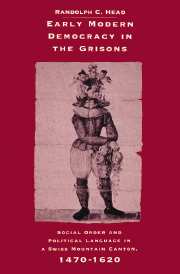 Early Modern Democracy in the Grisons
Early Modern Democracy in the Grisons Book contents
- Frontmatter
- Contents
- List of illustrations
- List of tables
- Acknowledgments
- Note on languages, orthography, and translations
- Abbreviations
- INTRODUCTION: Social order, politics, and political language in Graubünden, 1470–1620
- 1 Communalism and other political models in Europe and in Graubünden
- 2 Graubünden to 1520: geography, society, history
- 3 Local practice and federal government in the Freestate
- 4 From consolidation to communal politics: the Freestate, ca. 1530–1580
- 5 Elite power and popular constraint in sixteenth-century Rhaetia
- 6 Reform, communal action and crisis, ca. 1580–1639
- 7 Political language and political cosmology during the crisis years
- CONCLUSION: Democracy in early modern Graubünden
- Bibliography
- Index
- CAMBRIDGE STUDIES IN EARLY MODERN HISTORY
7 - Political language and political cosmology during the crisis years
Published online by Cambridge University Press: 14 October 2009
- Frontmatter
- Contents
- List of illustrations
- List of tables
- Acknowledgments
- Note on languages, orthography, and translations
- Abbreviations
- INTRODUCTION: Social order, politics, and political language in Graubünden, 1470–1620
- 1 Communalism and other political models in Europe and in Graubünden
- 2 Graubünden to 1520: geography, society, history
- 3 Local practice and federal government in the Freestate
- 4 From consolidation to communal politics: the Freestate, ca. 1530–1580
- 5 Elite power and popular constraint in sixteenth-century Rhaetia
- 6 Reform, communal action and crisis, ca. 1580–1639
- 7 Political language and political cosmology during the crisis years
- CONCLUSION: Democracy in early modern Graubünden
- Bibliography
- Index
- CAMBRIDGE STUDIES IN EARLY MODERN HISTORY
Summary
The turbulent course of events in Rhaetia during the first part of the seventeenth century has long attracted historians' attention. Rich in dramatic events – violent confrontations, battles, factional and diplomatic maneuvering – and dominated by powerful personalities such as Jörg Jenatsch and Pompeius Planta, the Bündner Wirren always presented a tempting subject for historical studies. For a brief time, the situation in this marginal Alpine republic attracted the concern of diplomats and generals all over Europe, as Venice, France, and Spain fought over the strategic passes of the central Alps, and as Catholic and Calvinist Europe struggled over the future of the mountain communes and their subjects in the Valtellina.
Yet the chronic instability and conflict in early seventeenth-century Bünden was also a political and social predicament confronting all of the Freestate's inhabitants. Foreign pressure and growing confessional hostility exacerbated the contradictions inherent in Rhaetians' views of social and political order in such a way as to call into question the foundations, and even the existence, of the Rhaetian state. How did they respond? When their political institutions broke down, and when previously tractable problems led to violence that threatened the whole structure of the Leagues, Rhaetian leaders and writers, along with peasants and townspeople, moved to restore what they saw as the correct order of affairs.
- Type
- Chapter
- Information
- Early Modern Democracy in the GrisonsSocial Order and Political Language in a Swiss Mountain Canton, 1470–1620, pp. 199 - 245Publisher: Cambridge University PressPrint publication year: 1995


